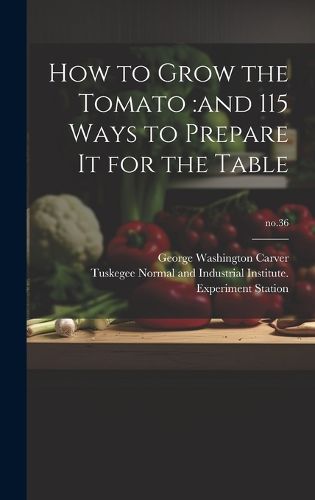Readings Newsletter
Become a Readings Member to make your shopping experience even easier.
Sign in or sign up for free!
You’re not far away from qualifying for FREE standard shipping within Australia
You’ve qualified for FREE standard shipping within Australia
The cart is loading…






Written by the renowned botanist and inventor George Washington Carver, How to Grow the Tomato and 115 Ways to Prepare It for the Table is an early 20th-century classic. This book offers practical advice on growing and harvesting tomatoes, as well as a plethora of recipes for dishes such as tomato soup, tomato sauce, stuffed tomatoes, and more. Whether you're an experienced gardener or a novice cook, this book is sure to inspire your culinary creativity.
This work has been selected by scholars as being culturally important, and is part of the knowledge base of civilization as we know it.
This work is in the "public domain in the United States of America, and possibly other nations. Within the United States, you may freely copy and distribute this work, as no entity (individual or corporate) has a copyright on the body of the work.
Scholars believe, and we concur, that this work is important enough to be preserved, reproduced, and made generally available to the public. We appreciate your support of the preservation process, and thank you for being an important part of keeping this knowledge alive and relevant.
$9.00 standard shipping within Australia
FREE standard shipping within Australia for orders over $100.00
Express & International shipping calculated at checkout
Written by the renowned botanist and inventor George Washington Carver, How to Grow the Tomato and 115 Ways to Prepare It for the Table is an early 20th-century classic. This book offers practical advice on growing and harvesting tomatoes, as well as a plethora of recipes for dishes such as tomato soup, tomato sauce, stuffed tomatoes, and more. Whether you're an experienced gardener or a novice cook, this book is sure to inspire your culinary creativity.
This work has been selected by scholars as being culturally important, and is part of the knowledge base of civilization as we know it.
This work is in the "public domain in the United States of America, and possibly other nations. Within the United States, you may freely copy and distribute this work, as no entity (individual or corporate) has a copyright on the body of the work.
Scholars believe, and we concur, that this work is important enough to be preserved, reproduced, and made generally available to the public. We appreciate your support of the preservation process, and thank you for being an important part of keeping this knowledge alive and relevant.